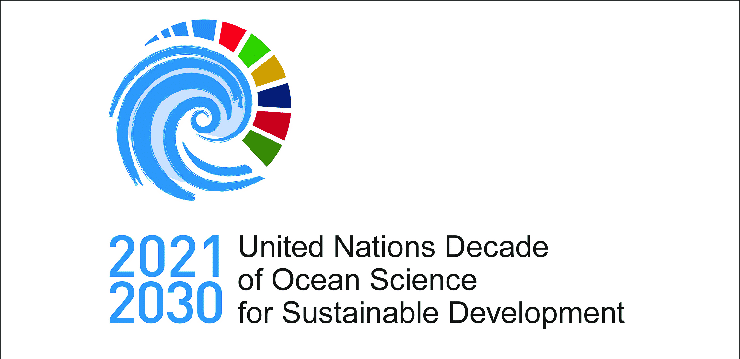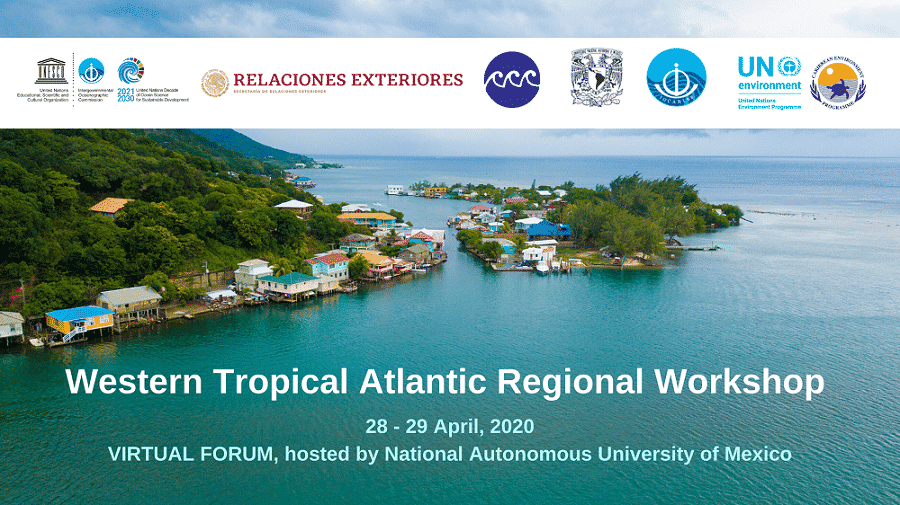
Do you hear me? – Can you understand me?
These were undoubtedly the most frequently asked questions at the Western Tropical Atlantic Regional Workshop in preparation for the UN Decade for Ocean Science for Sustainable Development 2021-2030.
I don’t want to criticize this, and on the contrary, it seems to be completely normal in these COVID-19 times, where we (have to) renounce traveling and personal meetings and meet virtually, online, in the home office, at a home-based conference. It’s incredible enough that during the presentations, you quickly get the feeling that you are really in a university lecture hall in Mexico and not in your home office in your underwear and jacket. I think I also voted for the first time in my life (I am now 57 years old) online in real-time over thousands of kilometers.
All this worked out wonderfully, at least better than I had imagined, which may also be due to my little imagination.
And you can also be at an international conference (I mean being a real conference now) and be heard and still not understood – just said.
I’m all in.
It’s a great thing that the UN wants to promote ocean science and wants to spend a whole decade on raising awareness of this vital science for our survival. It deserves all respect and attention and all energy to support it. I’m all in.
I am proud that I, as a New Jamaican, together with my esteemed colleague Prof. Mona Webber from the UWI, could officially represent Jamaica at that workshop.
What still amazes me after so many years is that the topic of the ocean, the pollution of the world’s oceans, the sustainable use of the sea, and combating the impact on the sea associated with climate change (such as rising sea levels) have little or no attention here in Jamaica…will be continued.
Context for the workshop
Due to the unprecedented situation caused by the COVID-19 virus, the UN Decade of Ocean Science for Sustainable Development (2021-2030): Western Tropical Atlantic Regional Workshop Organizing Committee, together with the local host, have decided to host this workshop virtually instead of face to face meeting. The event will provide a two-day virtual forum to gather ocean leaders/champions/key stakeholders to further discuss and prioritize the issues identified at the First Global Planning Meeting.
***
Following the First Global Planning Meeting, held in May, in Denmark, a Western Tropical Atlantic Workshop* will be convened in April 28-29, 2020. This event is being hosted by the Autonomous National University of Mexico (UNAM) and co-organized by the Government of Mexico with the Intergovernmental Oceanographic Commission (IOC) as coordinating body for the Decade and the Secretariat of the Cartagena Convention (UN Environment).
The Western Tropical Atlantic Regional Workshop offers a crucial opportunity to co-design mission-oriented ocean research strategies in line with the 2030 Agenda, Sustainable Development Goals (SDG), particularly SGD 14, the Convention for the Protection and Development of the Marine Environment of the Wider Caribbean, and the SAMOA Pathway.
It will aim to identify:
-Knowledge gaps and regional ocean science priorities for the 2030 Agenda
-Existing relevant partnerships/networks/initiatives and potential ones/interested partners
-Priorities in capacity-development/training-Priority themes and topics to be addressed by the Decade
-Other regional initiatives and meetings to be aligned with the Decade.
This workshop will be part of a continued global dialogue throughout 2020 via conference side-events, further thematic workshops and the Decade Online Community Platform to inform the planning of the Decade. The Decade of Ocean Science is an inclusive and truly global initiative, and broad engagement will be key to success.
*Countries, Associated Statesand Territories of the Western Tropical Atlantic: Antigua and Barbuda, Aruba, Bahamas,Barbados, Belize, Bermuda, Brazil, Colombia, Costa Rica, Cuba, Curacao,Dominica, Dominican Republic, France, Grenada, Guatemala, Guyana, Haiti,Honduras, Jamaica, Mexico, Netherland, Nicaragua, Panama, Saint Kitts andNevis, St. Lucia, St. Maarten, St. Vincent and the Grenadines, Surinam,Trinidad and Tobago, United Kingdom, United States of America, Venezuela. Puerto Rico (United States ofAmerica), Anguilla (United Kingdom), British Virgin Islands (United Kingdom),Cayman Islands (United Kingdom), French Guiana (France), Guadeloupe (France),Montserrat (United Kingdom), Martinique (France), Bonaire, Saint Eustatius,Saba (Special Municipalities of the Netherlands), Saint Barthelemy (France),Saint Martin (France), Turks and Caicos (United Kingdom), United States VirginIslands (United States of America).
United Nations Decade of Ocean Sciences for Sustainable Development 2021- 2030: Regional Workshop for the Western Tropical AtlanticApril 28th and 29th, 2020. Organized and transmitted by UNAM (National Autonomous University of Mexico) Program of the Virtual Meeting in Mexico City The main objective of this Regional Consultation is to facilitate dialogue and discussion for experts and stakeholders to define the scientific priorities for the Western Tropical Atlantic region for the UN Decade of Ocean Sciences for Sustainable Development 2021-2030 and to engage and identify new and broader stakeholders and partnerships. This meeting is part of point 13 of the Work Plan of the Pro Tempore Presidency of Mexico at the Community of Latin American and Caribbean States (CELAC) “Sustainable Management of the Oceans”, which aims to identify the main regional and sub-regional needs to contribute to the countering of the effects of climate change and promote the blue economy. |
Opening / Welcome |
|
Working Group 1: A clean ocean where sources of pollution are identified, quantified and reduced and pollutants are removed from the ocean |
|
Working Group 2: A healthy and resilient ocean in which marine ecosystems are mapped and protected, multiple impacts including climate change are measured and reduced, and ocean ecosystem delivery is maintained. |
|
Working Group 3: A predicted ocean whereby society has the capacity to understand current and future ocean conditions, forecast their change and impact on human wellbeing and livelihoods |
|
Working Group 4: A safe ocean whereby human communities are protected from ocean hazards and where the safety of operations at sea and on the coast is ensured. |
||||||
|
||||||
Working Group 6: A transparent and accessible ocean whereby all nations, stakeholders and citizens have access to ocean data and information, technologies and have the capacities to inform their decisions. |
||||||
|
||||||
Panel on cross-cutting issues |
||||||
|

